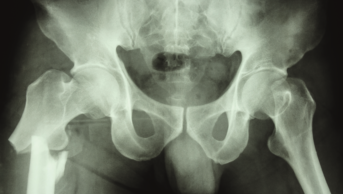
Michael Siluk/Alamy stock photo
Taking opioids together with benzodiazepines — often prescribed to treat anxiety and sleep problems — is linked to an increased risk of opioid overdose, according to the results of a study published in The BMJ
[1]
(online, 14 March 2017).
The researchers calculate that hospital A&E visits or admissions owing to opioid overdose could be reduced by 15% if concurrent use of these two types of drugs was stopped.
“Opioids should be prescribed cautiously — even if only for a short-term course — among patients who are also using benzodiazepines,” the researchers say. “Healthcare systems might also want to implement education programmes that warn prescribers and patients about the risks of taking benzodiazepines and opioids concurrently.”
The researchers base their conclusions on an analysis of 315,428 insured US patients who collected at least one prescription for an opioid between 2001 and 2013. They then searched that group for patients who also used benzodiazepines concurrently — defined as an overlap of at least one day — and looked for evidence of admission to hospital or an emergency room visit for opioid overdose.
The researchers discovered that concurrent use of both opioids and benzodiazepines was associated with an increased risk of an emergency room visit or inpatient admission for opioid overdose compared with opioid users who did not use benzodiazepines (adjusted odds ratio [OR] 2.14, 95% confidence interval [CI] 2.05 to 2.24; P<0.001).
Both intermittent and chronic opioid users who used a benzodiazepine concurrently experienced a higher incidence of emergency room visits or inpatient admissions for opioid overdose compared with intermittent and chronic opioid users who did not use a benzodiazepine concurrently (OR 1.42, 95% CI 1.33 to 1.51; P<0.001 and 1.81, 95% CI 1.67 to 1.96; P<0.001, respectively).
Over the course of the study, concurrent use of opioids and benzodiazepines increased by 80% (in 2001, 9% of opioid users also used a benzodiazepine, increasing to 17% in 2013).
In an accompanying editorial[2]
, researchers express concern about the concurrent prescribing of these two kinds of drugs that they describe as an “unsound and growing clinical practice” and an example of “low value care”.
But they warn that “busy clinicians will struggle to keep up with their patients’ use of different prescriptions” and suggest that systems should be set up to “push information to providers”. They also recommend a “multi-pronged effort from both regulators and experts writing clinical guidelines, along with extensive expansion in warnings about the hazards of drug-drug interactions… to reduce low value, potentially dangerous care”.

Source: Courtesy, Roger Knaggs
Roger Knaggs, specialist in pain management, says it is much less common for patients to receive prescriptions from more than one GP surgery in the UK
Commenting on the research, Roger Knaggs, specialist in pain management and associate professor in clinical pharmacy practice at the school of pharmacy, University of Nottingham, says the findings confirm the results of earlier studies and are based on an “association” rather than “causation”.
He also points out that the number of benzodiazepine and opioid-related deaths is much lower in the UK and Europe than in the United States and Canada, adding: “There are a host of factors that may contribute to these differences in prescribing practice and public health concerns. In particular, healthcare systems in the United States and the UK are very different and it is much less common for patients to receive prescriptions from more than one GP surgery in the UK.”
Knaggs says all doctors and pharmacists will be aware of the increased sedative effect when opioids and benzodiazepines are prescribed together and adds: “Opioids and benzodiazepines should certainly be used with caution and for short periods. However, perhaps what is less commonly recognised is the importance of psychological wellbeing in patients with long-term pain. As described in the accompanying editorial, a multi-faceted approach to tackling this is required of which education is just one component.”
References
[1] Sun E C, Dixit A, Humphreys K et al. Association between concurrent use of prescription opioids and benzodiazepines and overdose: retrospective analysis. BMJ 2017;356:j760. doi: 10.1136/bmj.j760
[2] Karaca-Mandic P, Meara E & Morden N E. The growing problem of co-treatment with opioids and benzodiazepines. A powerful example of potentially dangerous low value care. BMJ 2017;356:j1224. doi: 10.1136/bmj.j1224


